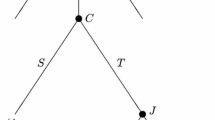Abstract
This paper asks to what extent institutional features that facilitate tax evasion may keep Leviathan governments at bay. The specific feature we look at is banking secrecy abroad. The analysis draws on a 16-generation OLG model in which tax rates are determined in a repeated game between voters and a rent-seeking Leviathan government. Key insights are: (1) Effects on any generation alive when change takes place may differ substantially from steady-state effects that accrue for generations yet to be born. (2) There is considerable intergenerational diversity in these effects that is not monotonic as we move from young to old. Combined, these results suggest that the political economy of pertinent institutional change may be quite complex.
Similar content being viewed by others
References
Allingham, M. G., & Sandmo, A. (1972). Income tax evasion: a theoretical analysis. Journal of Public Economics, 1, 323–338.
Bacchetta, P., & Espinosa, M. (1995). Information sharing and tax competition among governments. Journal of International Economics, 39, 103–121.
Bacchetta, P., & Espinosa, M. (2000). Exchange-of-information clauses in international tax treaties. International Tax and Public Finance, 7(3), 275–293.
Barro, R. J. (1973). The control of politicians: an economic model. Public Choice, 14, 19–41.
Boadway, R., & Keen, M. (1998). Evasion and time consistency in the taxation of capital income. International Economic Review, 39(2), 461–476.
Brennan, G., & Buchanan, J. A. (1980). The power to tax: Analytical foundations of a fiscal constitution. Cambridge: Cambridge University Press.
Chari, V. V., Kehoe, P. J., & Prescott, E. C. (1989). Time consistency and policy. In R. Barro (Ed.), Modern business cycle theory. Cambridge: Harvard University Press.
Eggert, W., & Kolmar, M. (2004). The taxation of financial capital under asymmetric information and the tax competition paradox. Scandinavian Journal of Economics, 106, 83–105.
Ferejohn, J. (1986). Incumbent performance and electoral control. Public Choice, 50.
Fischer, S. (1980). Dynamic inconsistency, cooperation and the benevolent dissembling government. Journal of Economic Dynamics and Control, 2(1), 93–107.
Huizinga, H., & Nielsen, S. B. (2003). Withholding taxes or information exchange: the taxation of international interest flows. Journal of Public Economics, 87, 39–72.
Kollintzas, T., Philippopoulos, A., & Vassilatos, V. (2000). Is tax policy coordination necessary? Mimeo, Athens University.
Marchand, M., Pestieau, P., & Sato, M. (2003). Can partial fiscal coordination be welfare worsening? A model of tax competition. Journal of Urban Economics, 54, 451–458.
Niskanen, W. (1971). Bureaucracy and representative government. Chicago: Rand McNally.
Persson, T., Roland, G., & Tabellini, G. (2000). Comparative politics and public finance. Journal of Political Economy, 108, 1121–1161.
Racheter, D. P., & Wagner, R. E. (1999). Limiting Leviathan. Cheltenham/Northhampton: Edward Elgar.
Rogers, C. A. (1987). Expenditure taxes, income taxes, and time-inconsistency. Journal of Public Economics, 32(2), 215–230.
Rogoff, K. (1990). Equilibrium political budget cycles. American Economic Review, 80, 21–36.
Schnellenbach, J. (2006). Tax morale and the taming of Leviathan. Constitutional Political Economy, 17, 115–130.
Stigler, G. J. (1971). The theory of economic regulation. Bell Journal of Economics, 2, 3–21.
Tullock, G. (1967). The welfare costs of tariffs, monopolies, and theft. Economic Inquiry, 5(3), 224–232.
Author information
Authors and Affiliations
Corresponding author
Additional information
We thank the editor and two anonymous referees for a host of constructive comments and suggestions. Frode Brevik gratefully acknowledges financial support from the University of St. Gallen’s Basic Research Fund.
Rights and permissions
About this article
Cite this article
Brevik, F., Gärtner, M. Can tax evasion tame Leviathan governments?. Public Choice 136, 103–122 (2008). https://doi.org/10.1007/s11127-008-9284-z
Received:
Accepted:
Published:
Issue Date:
DOI: https://doi.org/10.1007/s11127-008-9284-z




